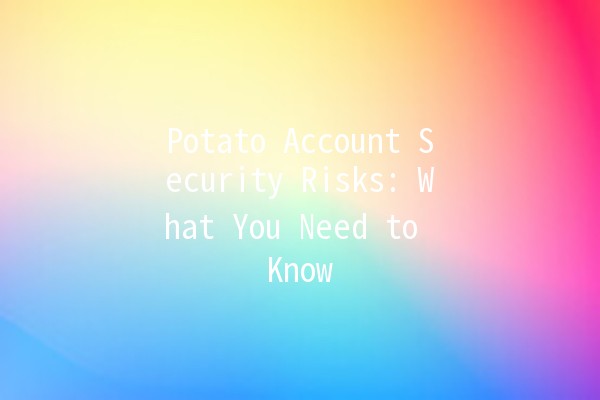In today's digital landscape, account security is a topic that cannot be overstated. With the increasing volume of personal and sensitive information being stored online, ensuring that your accounts are secure is more important than ever. This article will delve into the security risks associated with "Potato" accounts, focusing on practical advice to bolster your online safety. We will explore various threats, including phishing, weak passwords, and account recovery processes, and provide actionable tips to enhance your security posture.
Understanding the Risks of Potato Accounts
What Are Potato Accounts?

Before diving into security risks, it’s essential to clarify what we mean by "Potato" accounts. These accounts could refer to any online service that emphasizes convenience over security, often leading to vulnerabilities. Many platforms prioritize user experience, sometimes at the expense of robust security protocols.
Common Security Threats
Enhancing Your Potato Account Security
To protect your Potato accounts, consider the following productivity enhancement techniques that focus on security:
Description: A strong password is your first line of defense against unauthorized access. Create complex passwords that combine letters, numbers, and special characters.
Application Example:
Create a password using a password manager: Use a password manager to generate random, long passwords for each of your accounts. This way, you won't need to remember every password, just the master password for the manager.
Description: Twofactor authentication adds an extra layer of security by requiring a second form of verification in addition to your password.
Application Example:
Use an authenticator app: Instead of relying on SMS for 2FA, use an authenticator app like Google Authenticator or Authy. This approach is more secure as it reduces the risk of interception.
Description: Regularly changing your passwords ensures that even if someone gains access to them, their window of opportunity is limited.
Application Example:
Set reminders: Use calendar reminders to prompt you to change your passwords every three to six months.
Description: Being able to recognize phishing attempts can save you from compromising your account.
Application Example:
Phishing training: Engage in cybersecurity awareness training to better identify phishing emails and suspicious links. Organizations can offer simulations to enhance awareness.
Description: Keeping an eye on your accounts allows you to catch any unauthorized activities early.
Application Example:
Set up alerts: Most platforms offer account activity alerts. Turn these on to receive notifications for logins from unrecognized devices or unusual activity.
Addressing Common Concerns About Potato Account Security
If you suspect your Potato account has been compromised, immediately change your password and enable 2FA. Review your recent account activity for any unauthorized actions. If necessary, contact customer support to secure your account further.
Look for signs such as poor grammar, unfamiliar sender addresses, and urgent calls to action. Always check for misspellings in URLs and avoid clicking on links in suspicious emails. Instead, navigate to websites directly through your browser.
No. Using the same password across multiple accounts significantly increases the risk of being hacked. If one account is compromised, all others using the same password become vulnerable as well.
Consider using a reputable password manager to store your passwords securely. Avoid writing them down or storing them in unencrypted files.
Use the account recovery options provided by the service. If possible, utilize the 2FA method you have set up. For enhanced security, avoid using recovery questions that can be easily guessed.
Public WiFi networks are inherently insecure. Avoid accessing sensitive accounts over public networks unless you’re using a VPN. If you must, ensure you’re not entering sensitive information while connected.
al Thoughts on Potato Account Security
Implementing these security measures may seem overwhelming, but by gradually incorporating them into your routine, you can significantly enhance the safety of your Potato accounts. Remember, cybersecurity is not only the responsibility of service providers but also of users. Staying informed and proactive about your online security will go a long way in protecting your personal information.
Additionally, encourage your friends and family to take these precautions seriously. The more people understand the risks associated with their online activities, the safer everyone's digital environment will become.
By making security a priority, you'll not only protect your Potato accounts but also cultivate a more secure online community for everyone. 🐾